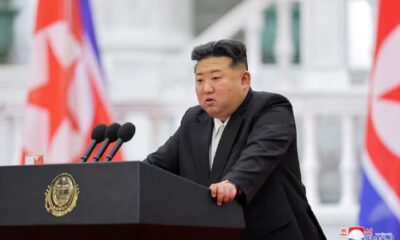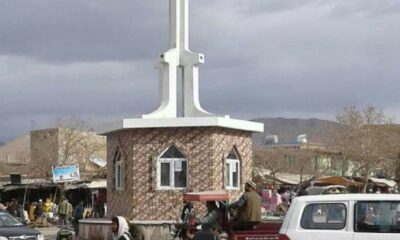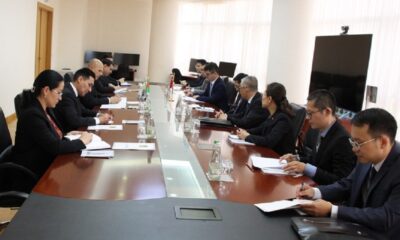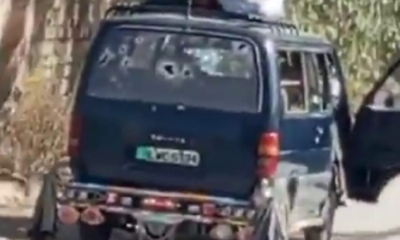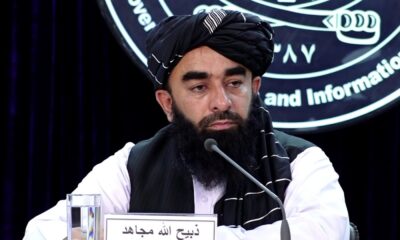World
Kazakhstan government’s resignation fails to quell protests

Protesters stormed public buildings in Kazakhstan's biggest city on Wednesday as security forces struggled to impose control after the government resigned in response to popular anger over a fuel price increase.
An Instagram live stream by a Kazakh blogger showed a fire blazing in the mayor's office in the city of Almaty, with gunshots audible nearby. Videos posted online also showed the nearby prosecutor's office burning.
Protesters appeared to have broken through security forces' cordons even though the latter deployed stun grenades whose explosions could be heard throughout the city center.
Kazakhstan is a tightly controlled former Soviet republic that cultivates an image of political stability, helping it attract hundreds of billions of dollars of foreign investment in its oil and metals industries.
President Kassym-Jomart Tokayev accepted the government's resignation on Wednesday, a day after police used tear gas and stun grenades to drive hundreds of protesters out of the main square in Almaty.
On Wednesday a Reuters correspondent saw thousands of protesters pressing ahead towards Almaty city center, some of them on a large truck, after security forces failed to disperse them with tear gas and flashbang grenades.
Atameken, Kazakhstan's business lobby group, said its members were reporting cases of attacks on banks, stores, and restaurants.
The city health department said 190 people had sought medical help, including 137 police. City authorities urged residents to stay home.
The interior ministry said that government buildings were also attacked in the southern cities of Shymkent and Taraz overnight, with 95 police wounded in clashes. Police have detained more than 200 people.
A video posted online showed police using a water cannon and stun grenades against protesters in front of the mayor's office in Aktobe, the capital of another western province
The protests began after the government lifted price controls on liquefied petroleum gas at the start of the year. Many Kazakhs have converted their cars to run on LPG because of its low cost.
The government said the regulated price was causing losses for producers and needed to be liberalized. The president said it had botched the move.
Speaking to acting cabinet members, Tokayev ordered them and provincial governors to reinstate price controls on LPG, and broaden them to gasoline, diesel, and other "socially important" consumer goods.
He also ordered the government to develop a personal bankruptcy law and consider freezing utility prices and subsidizing rent payments for poor families.
He said the situation was improving in protest-hit cities and towns, including Almaty and the surrounding province, where the authorities declared a state of emergency.
In addition to replacing the prime minister, Tokayev also appointed a new first deputy head of the National Security Committee who replaced Samat Abish, a nephew of powerful ex-president Nursultan Nazarbayev.
Nazarbayev, 81, a Soviet-era Communist Party boss, ran Kazakhstan for almost 30 years before resigning abruptly in 2019 and backing Tokayev as successor. Nazarbayev retains sweeping powers as the chairman of the security council; he has not convened the council or commented on this week's violence.
The protests began in the oil-producing western province of Mangistau on Sunday, after LPG prices more than doubled following the lifting of caps.
A source familiar with the situation said some workers at Mangistaumunaigas, a Kazakh-Chinese oil-producing joint venture based in the Mangistau province, were on strike, although this was not affecting output so far.
Tokayev declared the emergency in Almaty and Mangistau and has said that domestic and foreign provocateurs were behind the violence.
Almaty mayor Bakytzhan Sagintayev said the situation in the city was under control and security forces were detaining "provocateurs and extremists".
Kazakhstan's dollar-denominated sovereign bonds suffered sharp falls with the 2045 issue falling around 3 cents in the dollar and many dropping to levels last seen in 2020, Tradeweb data showed.
Like many emerging and developing economies, Kazakhstan has grappled with rising price pressures in recent years. Inflation was closing in on 9% year-on-year late last year - its highest level in more than five years - forcing the central bank to raise interest rates to 9.75%.
Some analysts said the protests - the most serious in the country in at least a decade - pointed to more deep-rooted issues.
"I think there is an underlying undercurrent of frustrations in Kazakhstan over the lack of democracy," said Tim Ash, emerging market strategist at BlueBay Asset Management.
"Young, internet-savvy Kazakhs, especially in Almaty, likely want similar freedoms as Ukrainians, Georgians, Moldovans, Kyrgyz, and Armenians, who have also vented their frustrations over the years with authoritarian regimes."
World
North Korea’s Kim accuses US of stoking tension, warns of nuclear war

North Korean leader Kim Jong Un has accused the United States of ramping up tension and provocations, saying the Korean peninsula has never faced a greater risk of nuclear war, state media KCNA said on Friday.
The comments came amid international criticism over increasingly close military co-operation between Pyongyang and Moscow, and assertions that North Korea sent more than 10,000 troops to Russia to support its invasion of Ukraine, Reuters reported.
Previous negotiations with Washington have only highlighted its "aggressive and hostile" policy toward North Korea, Kim said in a speech at a military exhibition in Pyongyang, the capital, the KCNA news agency said.
"Never before have the warring parties on the Korean peninsula faced such a dangerous and acute confrontation that it could escalate into the most destructive thermonuclear war," he said on Thursday.
"We have already gone as far as we can on negotiating with the United States," he said, adding that the talks had only shown its aggressive and hostile policy toward North Korea could never change.
North Korean state media have not yet publicly mentioned the re-election of Donald Trump, who held three unprecedented meetings with Kim during his first term, in Singapore, Hanoi, and at the Korean border, in 2018 and 2019.
But their diplomacy yielded no concrete outcome due to the gap between U.S. calls for North Korea to abandon its nuclear weapons and Kim's demands for sanctions relief.
Trump has long touted his ties with Kim, saying last month the two countries would have had "a nuclear war with millions of people killed", but he had stopped it, thanks to his ties with the North's leader.
Hong Min, a research fellow at the Korea Institute for National Unification in Seoul, said Kim could be trying to underscore the North's nuclear capabilities ahead of Trump's second term, while leaving the door open for diplomacy.
"He might be suggesting Trump should show his 'willingness to co-exist' before re-opening any talks and calling for a change in the U.S. hostile attitude," Hong said.
MILITARY EXHIBITION
Kim also called for developing and upgrading "ultra-modern" versions of weaponry, and vowed to keep advancing defence capabilities to bolster the North's strategic position, KCNA said.
Strategic and tactical weapons were on display at the event, called the Defence Development Exhibition.
KCNA pictures showed the Hwasong-19 and 18 intercontinental ballistic missiles, the Chollima-1 rocket used in a successful satellite launch in November 2023, and the Saetbyol-9 multi-purpose attack drone, which resembles the U.S. Reaper.
Hong said the pictures also included several weapons needed by or presumed to already have been supplied to Russia for its war in Ukraine, such as 240mm multiple rocket launchers, self-propelled howitzers, anti-tank systems and drones.
North Korea has shipped additional arms to Russia, the South's lawmakers said on Thursday, after being briefed by the national intelligence agency.
Last year, when he was defence minister, Russian Security Council Secretary Sergei Shoigu accompanied Kim to a defence fair that showcased missiles and weapons.
Last week, Kim urged the North's military to improve its war-fighting capabilities, blaming the United States and its allies for stoking tension to "the worst phase in history" and calling the Korean peninsula "the world's biggest hotspot".
World
ICC issues arrest warrants for Israel’s Netanyahu, Gallant and Hamas leader
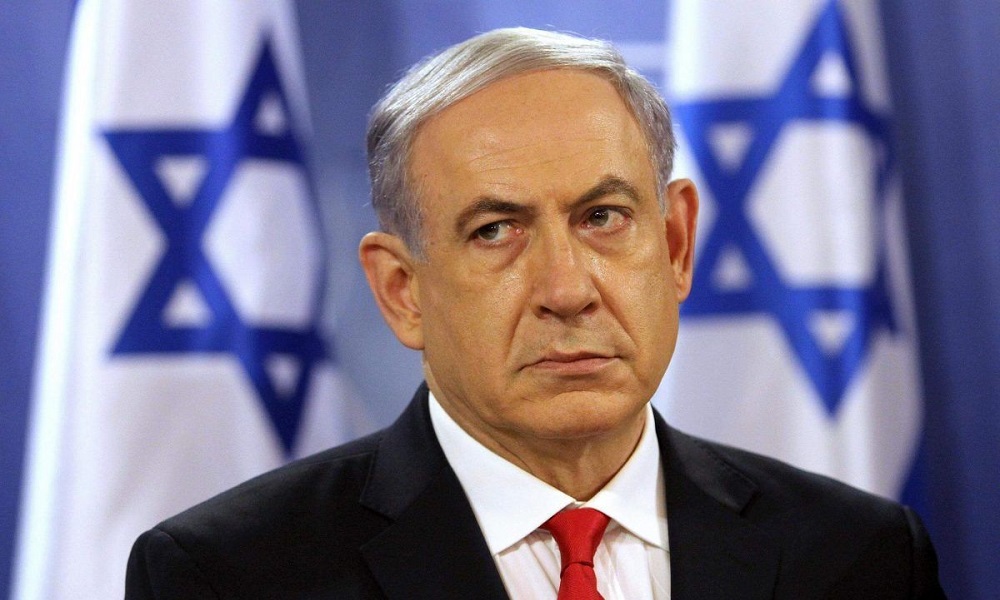
Judges at the International Criminal Court have issued arrest warrants for Israeli Prime Minister Benjamin Netanyahu and his former defence chief, as well as a Hamas leader, Ibrahim Al-Masri, for alleged war crimes and crimes against humanity, Reuters reported on Thursday afternoon.
The move comes after the ICC prosecutor Karim Khan announced on May 20, that he was seeking arrest warrants for alleged crimes connected to the Oct.7, 2023 attacks on Israel by Hamas and the Israeli military response in Gaza.
The ICC said Israel's acceptance of the court's jurisdiction was not required.
Israel has rejected the jurisdiction of the Hague-based court and denies war crimes in Gaza.
Israel has said it killed Al-Masri, also known as Mohammed Deif, in an airstrike but Hamas has neither confirmed nor denied this.
World
US vetoes UN Security Council resolution on Gaza ceasefire

The United States on Wednesday vetoed a U.N. Security Council resolution for a ceasefire in Gaza, drawing criticism of the Biden administration for once again blocking international action aimed at halting Israel's war with Hamas.
The 15-member council voted on a resolution put forward by 10 non-permanent members that called for an "immediate, unconditional and permanent ceasefire" in the 13-month conflict and separately demanded the release of hostages, Reuters reported.
Only the U.S. voted against, using its veto as a permanent council member to block the resolution.
Robert Wood, deputy U.S. ambassador to the U.N., said Washington had made clear it would only support a resolution that explicitly calls for the immediate release of hostages as part of a ceasefire.
"A durable end to the war must come with the release of the hostages. These two urgent goals are inextricably linked. This resolution abandoned that necessity, and for that reason, the United States could not support it," he said.
Wood said the U.S. had sought compromise, but the text of the proposed resolution would have sent a "dangerous message" to Hamas that "there's no need to come back to the negotiating table."
Israel's campaign in Gaza has killed nearly 44,000 people and displaced nearly all the enclave's population at least once. It was launched in response to an attack by Hamas-led fighters who killed 1,200 people and captured more than 250 hostages in Israel on Oct. 7, 2023.
Members roundly criticized the U.S. for blocking the resolution put forward by the council's 10 elected members: Algeria, Ecuador, Guyana, Japan, Malta, Mozambique, South Korea, Sierra Leone, Slovenia and Switzerland.
"It is deeply regretted that due to the use of the veto this council has once again failed to uphold its responsibility to maintain international peace and security," Malta's U.N. Ambassador Vanessa Frazier said after the vote failed, adding that the text of the resolution "was by no means a maximalist one."
"It represented the bare minimum of what is needed to begin to address the desperate situation on the ground," she said.
Food security experts have warned that famine is imminent among Gaza's 2.3 million people.
U.S. President Joe Biden, who leaves office on Jan. 20, has offered Israel strong diplomatic backing and continued to provide arms for the war, while trying unsuccessfully to broker a ceasefire deal between Israel and Hamas that would see hostages released in exchange for Palestinians held by Israel.
After blocking earlier resolutions on Gaza, Washington in March abstained from a vote that allowed a resolution to pass demanding an immediate ceasefire.
A senior U.S. official, who briefed reporters on condition of anonymity ahead of Wednesday's vote, said Britain had put forward new language that the U.S. would have supported as a compromise, but that was rejected by the elected members.
Some members were more interested in bringing about a U.S. veto than compromising on the resolution, the official said, accusing U.S. adversaries Russia and China of encouraging those members.
'GREEN LIGHT'
France's ambassador Nicolas de Riviere said the resolution rejected by the U.S. "very firmly" required the release of hostages.
"France still has two hostages in Gaza, and we deeply regret that the Security Council was not able to formulate this demand," he said.
China's U.N. ambassador, Fu Cong, said each time the United States had exercised its veto to protect Israel, the number of people killed in Gaza had steadily risen.
"How many more people have to die before they wake up from their pretend slumber?" he asked.
"Insistence on setting a precondition for ceasefire is tantamount to giving the green light to continue the war and condoning the continued killing."
Israel's U.N. ambassador Danny Danon said ahead of the vote the text was not a resolution for peace but was "a resolution for appeasement" of Hamas.
"History will remember who stood with the hostages and who abandoned them," Danon said.
-

 Sport5 days ago
Sport5 days agoFIFA unveils Innovative Club World Cup Trophy ahead of new tournament in 2025
-

 Latest News5 days ago
Latest News5 days agoCanada sent 19 failed asylum seekers back to Afghanistan last year
-

 Sport4 days ago
Sport4 days agoAbu Dhabi’s thrilling T10 tournament just days away
-

 World4 days ago
World4 days agoBiden allows Ukraine to use US arms to strike inside Russia
-

 Sport4 days ago
Sport4 days agoAfghanistan beat UAE by 169 runs in U19 tri-series
-
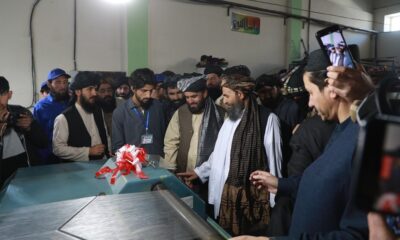
 Business5 days ago
Business5 days agoMullah Baradar inaugurates a blanket factory in Kabul
-

 Latest News3 days ago
Latest News3 days agoTajikistan trumps Afghanistan 3-1 in football friendly
-
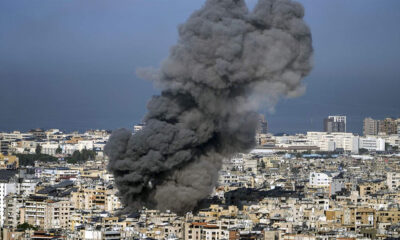
 World3 days ago
World3 days agoLebanon, Hezbollah agree to US proposal for ceasefire with Israel, Lebanese official says


